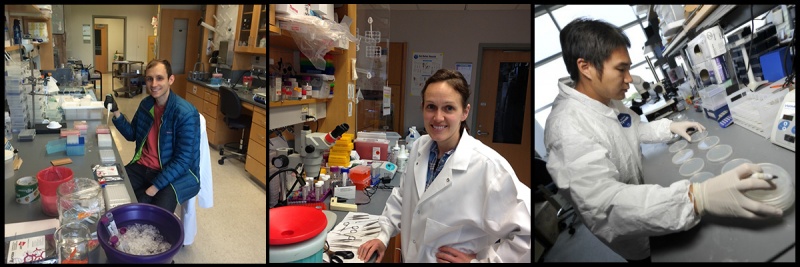Training Overview
Vanderbilt University has become a nationally recognized center for the training of graduate students and postdoctoral fellows for research careers in environmental toxicology. Through the National Institutes of Health training grant as well as other support, provides the opportunity for graduate students and postdoctoral associates to participate in programs emphasizing molecular aspects of toxicology. The training program has two main elements: (i) graduate student (Ph.D.) training through the Interdisciplinary Graduate Program (IGP), and (ii) postdoctoral training with all of the participating preceptors.

GRADUATE STUDIES
Students completing bachelor’s or master’s degrees in chemistry, biology, biochemistry, or related disciplines are encouraged to apply for admission. Students accepted for graduate study receive yearly stipends as well as all tuition expenses. Graduate Record Examination scores on the aptitude sections and one advanced test, transcripts, and three letters of reference are required for admission. Depending upon individual areas of interest, graduate students may apply to one of three graduate school programs: 1) the Interdisciplinary Graduate Program, 2) the Qualitative and Chemical Biology Program or 3) the Chemistry Graduate Program. Students must fulfill normal Ph.D. requirements with concentrations in the home department disciplines (i.e. Pediatrics, Neurology, Biochemistry, Chemistry, Pathology, Microbiology, immunology) of their preceptors and postdoctoral training with all of the named preceptors participating.
Students admitted to the toxicology program rotate through several Center Investigators’ laboratories, depending upon interests, during the first year of study and then choose a permanent preceptor. All students in the toxicology program (which leads to a doctorate or master’s degree) are required to enroll and pass in a 3-credit-hour course, BCHM 8336, Biochemical and Molecular Toxicology. The candidate’s training focuses on the basic principles of chemical, biomedical and biological sciences through required “gateway” coursework in biochemistry, chemistry, cell biology, and physiology. Trainees specialize in allied areas through elective coursework, research rotations, seminars, and workshops. Some of the major areas of investigation relating to environmental toxicology are enzymatic oxidation and conjugation, oxidative damage, DNA adduct chemistry, mechanisms of mutagenesis, structural and regulatory biology, analytic method development, and neurotoxicology. An oral defense of the research dissertation completes the requirements for graduation.
Financial Aid
Students accepted for graduate study receive yearly stipends, as well as tuition and fee waivers. The NIEHS grant (NIH T32 ES007028, Training Program in Environmental Toxicology) supports only a part of the total pool of pre- and postdoctoral trainees. Other sources of support include individual research grants awarded to Center Investigators, University teaching assistantships (Chemistry Department only), competitively-awarded University fellowships, other training funds, as well as, other training grants available to some Center Investigators (cancer, pharmacology, biophysics, reproductive biology), the Interdisciplinary Graduate Program (first 9 months), direct NIH, NSF, and other fellowships, and awards from foreign governments. In addition, university fellowships and scholarships for underrepresented minorities are available and awarded on a competitive basis. Stipend levels are at or above NIH levels for both pre- and postdoctoral trainees.
Applying
Application may be made directly to the Interdisciplinary Graduate Program (IGP) or Department of Chemistry. Criteria may vary between these two programs, so please visit the individual graduate program sites for detailed information regarding the application process.
POSTDOCTORAL RESEARCH
Postdoctoral training projects in toxicology or environmental health sciences emphasize a high degree of individual independence. Postdoctoral trainees should be able to pursue multiple projects, including projects that may form the basis for independent research programs when they assume independent positions. Postdoctoral trainees are given opportunities to develop skills in project development and research proposal writing. Trainees are strongly encouraged to plan and submit applications for NIEHS (F32) and other individual postdoctoral training awards.
Individuals interested in postdoctoral study should communicate directly with a faculty member in their area of interest. Such postdoctoral research associateships are generally for two- or three-year terms. The usual requirement for a postdoctoral research associate is a Ph.D. with a major or strong minor in biochemistry, chemistry, or pharmacology. Appropriate postdoctoral trainees with an M.D. or D.V.M. will also be accepted. Each postdoctoral trainee is involved in research under the supervision of a faculty member in order to gain expertise in a specific area. The postdoctoral trainee is encouraged to attend formal course offerings in toxicology, to participate in the research and literature seminars on toxicology, and to audit other formal graduate courses that are relevant to toxicology.